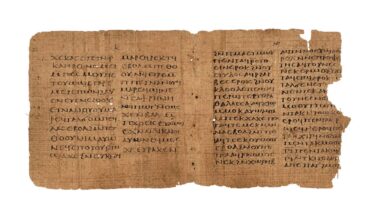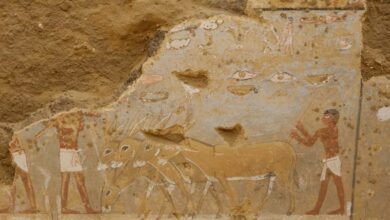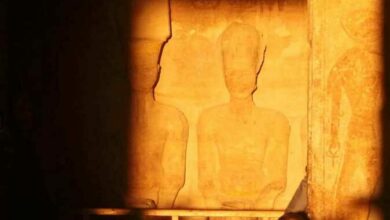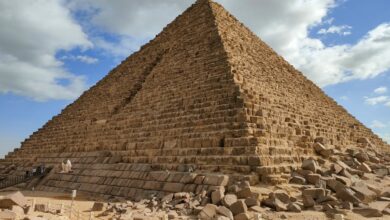After years of rejection by the Mubarak regime on the grounds that Egyptian antiquities are an issue of “national sovereignty,” the first Egyptian Archaeologists Syndicate was launched last week; and Fayza Haikal, Egyptology professor at The American University in Cairo, was chosen as its head.
On this occasion, Al-Masry Al-Youm talks to Haikal about the challenges the nascent syndicate is facing, from charges of corruption and antiquity theft against government officials – both before and after the protests erupted – to improving the work conditions of archaeologists and objections to the way Haikal was appointed.
Al-Masry Al-Youm: Of all the criticism the field of archaeology is currently facing, which issues are you planning to address first through your new position as head of the syndicate?
Fayza Haikal: I don't see that the syndicate is related to any of these issues. Archaeologists have been fighting to found their syndicate for 35 years, yet the political regime resisted. Now, with the changes the 25 January revolution is bringing about, we got a chance to make our dream come true.
Al-Masry: Won't the syndicate have a role in supporting its members in their struggles to have fixed contracts?
Haikal: The syndicate will support the legal demands of archaeologists, working both within and outside the ministry. But, people have to know that the syndicate is more of an interest/pressure group rather than a decision maker.
Unemployment, for instance, is high among graduates of the Faculty of Archaeology because there are minimal work opportunities outside of the ministry. At the same time, the ministry cannot employ all archaeologists the same year they graduate. So, whereas their demands are justified, archaeologists should be patient.
What I can promise them is that decision makers at the ministry, who are also members of the syndicate, promised to solve this problem soon.
Al-Masry: Some archaeologists are complaining that the younger generations are sidelined and receive limited excavation opportunities and recognition. How is the syndicate planning to tackle this problem?
Haikal: This is completely untrue. There is a large number of competent and established Egyptian archaeologists. This very syndicate was founded by young archaeologists.
Al-Masry: Still, they seem to receive little recognition.
Haikal: Again, that’s not true. We have, for example, Mohamed Abdel Maksood, the new secretary general of the Supreme Council of Antiquities (SCA). Abdel Maksood has excavated all over Egypt and he’s currently excavating a site in Luxor.
Al-Masry: What role will the syndicate have in fighting antiquity theft and pushing for proper museum security?
Haikal: The syndicate is not responsible for this; this is the role of the Antiquities Ministry.
Al-Masry: So, the syndicate will have nothing to do with this?
Haikal: All we can do is pressure the ministry to take action, but we cannot enforce anything. As I just told you, this is the ministry’s role.
Al-Masry: But you did interfere before. Last week you criticized poet Farouk Gowida for saying that the Museum of Islamic Art was looted during renovation and asked him to provide evidence.
Haikal: I only took over the syndicate last week, and I still don't know whether there’s a plan to secure antiquities and artifacts by the ministry. I accepted this position because archaeologists chose me, and to serve in the field I’m passionate about.
As for Gowida’s statements, I'm with providing evidence. The syndicate will neither defend the looters nor those who make unfounded accusations.
Al-Masry: There’ve been several protests accusing ministry officials of being involved in antiquity theft. Will the syndicate take a position on this issue?
Haikal: There are a lot of problems that people not affiliated with the field of archaeology will not grasp. Gowida, for instance, doesn’t get what an accusation of theft would need to be proved. Thousands of artifacts are undergoing inventory listing and check. This can’t be done in a day or two, but would take years.
Al-Masry: Even Minister of Antiquities Zahi Hawass is repeatedly accused of facilitating antiquity theft.
Haikal: Let the accusers prove it; if they can’t, then they can only blame themselves. We can't take action against people based on rumors.
Al-Masry: What about the secretary general of the SCA, Abdel Maksood, he was officially charged with corruption and forgery?
Haikal: If even Abdel Maksood is a suspect, then I guess we'd better all stay at home. Abdel Maksood works 24/7. Some people want to destroy every successful person they come across.
Al-Masry: How do you feel about objections to the way you were appointed? Archaeologists are complaining about the mechanism deployed, meaning that “representatives” from every governorate vote, rather than making an open invitation to all archaeologists.
Haikal: Even I wasn’t at the meeting. But, as I was told, representatives from all governorates chose me, all of them. I don't know why they voted for me, but I want to help, so I accepted the position.
I wonder why those who object didn’t voice their concerns from the beginning, rather than waiting until the very end. Either way, if the majority doesn’t want me, I’m ready to resign from heading the syndicate.
Al-Masry: Do you think that it’s appropriate for the minister to draft the syndicate law?
Haikal: Zahi Hawass worked on the law as an archaeologist and not as the Minister of Antiquities.
Al-Masry: So, you don’t see a conflict of interest in this?
Haikal: No, if Hawass left his position, he will still be an archaeologist. He will only act as a minister in this process, when he submits the draft law to the cabinet.
Al-Masry: Some archaeologists threatened to found an "independent syndicate" in objection to Hawass’s perceived control over the Archaeologists Syndicate?
Haikal: Well, if it’s legal to do that, I don't see a problem. They have the right to join any organization that reflects their opinions.
Al-Masry: But, this means that the syndicate will bear the same problems of syndicates under Mubarak, which suffered from government dependency and defections?
Haikal: This is how people act nowadays; they do a counter act to everything. Again, if it’s legal, then I don't mind.




